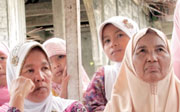
Across the Middle East and North Africa, particularly in countries emerging from the Arab Spring, women and gender-rights advocates face accusations of Western secular imperialism and cultural relativism. Advocates maintain that their position is neither imported nor new, and argue instead that indigenous feminism and historically progressive roles for women in society are being erased. Parallel and equally pressing questions and tensions are playing out in Southeast Asia.
In Indonesia, the world’s largest Muslim country, religious extremism is on the rise and threatens to reverse gains made by the women’s movement since the 1980s. Extremism, already fueling frequent violent incidents, also threatens to overturn Indonesia’s tradition of religious tolerance and pluralism. Islam is the leading religion in Southeast Asia, where many distinct cultures have practiced the faith with remarkable diversity. A recent resurgence of Islam—and identity politics driven by dynamics in the Middle East—has brought an increasingly shared identity and approach to Muslims in Southeast Asia, possibly giving rise to greater intolerance for minority views and groups in countries like Indonesia.
A recent report released by Cordaid captures one wave of homegrown feminism in Indonesia that challenges gender inequality and religious extremism while situating itself in a traditional Islamic space. Looking for that Other Face, by Frank van Lierde, tells the stories of six Indonesian Muslim women inspired by their faith to develop women’s leadership and work against sexual and domestic violence while countering the rise of extremist beliefs in their communities.
The report makes a significant contribution in documenting and vividly portraying indigenous feminism in a Muslim country. As one woman asserts in the report, “I am not a westerner. I am an Indonesian Muslim woman standing up for social justice.” For local actors opposed to expanding rights for women, these narratives help counter notions of women’s rights as imported Western values forced upon regions like Southeast Asia, the Middle East, and North Africa. For international actors, learning about indigenous and religious feminism can inform approaches to advocacy; supporters of women’s rights can learn to prioritize local voices and respect the translation of international human rights principles into cultural and religious terms that are more likely to persuade local populations and make a lasting positive impact.
All six women featured in the report come from and continue to work in the traditionally patriarchal world of the pesantren, or Islamic boarding school. In Indonesia, the pesantren is a powerful force of religion and values in society, with 27,000 religious schools currently housing and teaching millions of students. Teaching in the pesantren tends to follow kitab kuning, classical Islamic text books, but women leaders inside the schools say that reinterpretation can fight repression and extremism: “Rights, freedoms, obligations and traditions are always a question of interpretation and negotiation. And education gives the power to negotiate, to men as well as women.”
These are not new issues for the women’s movement in Indonesia, which came of age in the 1980s. Women began claiming their rights and positions in politics, civil society, the media, and religious and academic circles. At the time, the debate on gender equality and Islam was underway across the Arab world, with Muslim feminists leading the way. According to van Lierde, their views on Islam and society began “to break open the patriarchal, established political and religious order and give rise to discussions across the world.” However, this advocacy gave rise to continued tensions and notions of a “clash of civilizations,” and in some circles, women’s rights are still viewed as in tension with Islam.
The development of a women’s movement in Indonesia from inside the pesantren circumvents the resistance to secular feminism common in devout communities. As Muslim women take on leadership roles in a traditional Islamic domain, they can challenge patriarchal norms while maintaining religious authenticity. Badriyah Fayumi, who heads a pesantren in addition to long serving as a member of the national Parliament, says that because she “speaks in the same religious terms and cites the same sources,” she can convey her message of equality, “…that Islam can and must go together with respect for diversity, for religious, cultural and ethnic pluralism, for human rights.”
Inayah Rohmaniyah, a female Imam profiled in the report, explains how she uses her religious authority to work against extremism. She describes how the Muslim Brotherhood and Indonesian extremist groups bind communities to them, using funding from Middle East sources to invest locally. “They combine propaganda with services. They establish schools, from nurseries to universities, where parents can place their children in a strictly religious environment for very little money.” To be an effective alternative voice, Rohmaniyah must utilize religious and practical arguments. “As an expert on Islam, as a woman who comes from a traditional and even a Wahabi pesantren, I have more than enough cards to play to share my message, my view of Islam, with the same audience. I will quote the same religious sources and appeal to people’s same desire to get ahead in life, and with women in particular, I will talk about the situation at home and on the street, the future prospects for their children.” Rohmaniyah, like the other five women leaders profiled, demonstrates the importance of local identity and religious authenticity in working for women’s rights and against extremism.
These stories from Indonesia demonstrate that women religious leaders are succeeding in creating a space for dialogue with those seeking to impose a fundamentalist or extremist view of Islam on others, even in communities where a more open and tolerant Islam was the dominant predecessor. As the report notes, “Traditional Islam, human rights activism and feminism need not be mutually exclusive—they can inspire and augment one another.”
Andrea Ó Súilleabháin is a Visiting Fellow at the International Peace Institute.




